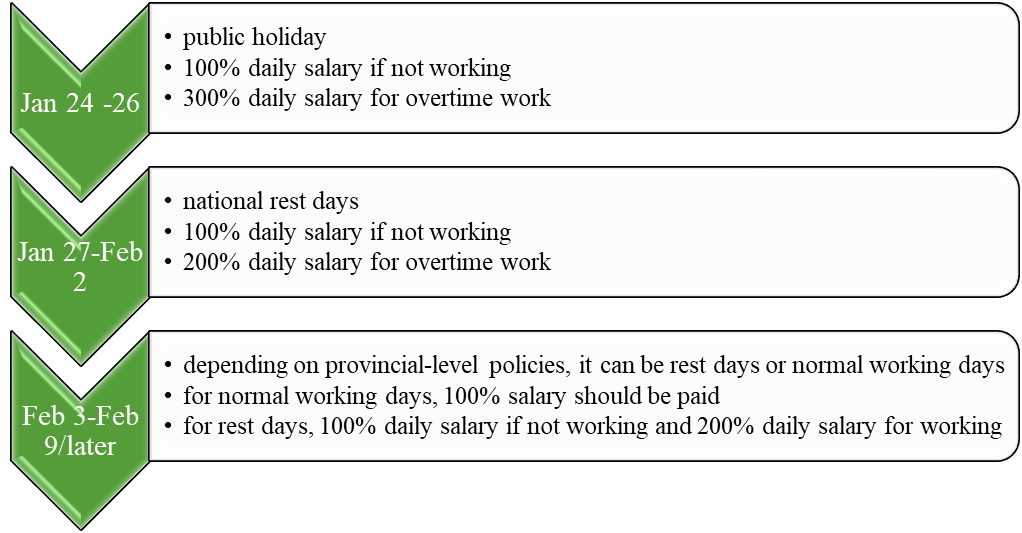Information contained in this publication is intended for informational purposes only and does not constitute legal advice or opinion, nor is it a substitute for the professional judgment of an attorney.
The official website of the National Health Commission of China (NHC) announced that, as of 12:00 pm on January 30th, there are a total of 7,737 confirmed coronavirus cases reported in China and 128 related deaths.
This outbreak has become a major public health safety issue as governments at both national and local levels take measures to prevent the spread of the coronavirus.
Significantly, many companies have been closed as a result of the Chinese New Year (Spring Festival), the largest holiday in China. Among other steps, the Peoples’ Republic of China (PRC) State Council announced an extension of the Spring Festival holiday to February 2, 2020, and many provinces have requested that enterprises not resume work until February 9, 2020.
The virus and the related measures to limit its spread raise a number of challenges for employers with operations in China: how to provide safe work conditions for employees in China; how to adjust the work schedule for February; the impact of the measures on overtime pay; and other matters.
This article addresses several key matters.
Employers Must Take Steps to Protect Employee Safety
On January 20, 2020, NHC issued a notice (No. 1 of 2020) stating that even though pneumonia caused by the coronavirus should be included in Class B under the PRC Prevention and Treatment of Infectious Diseases Law (PTID), employers must follow the more aggressive prevention and control measures listed for infectious diseases under Class A:
- provide employees with safe and sanitary working conditions and necessary working protection supplies in accordance with state regulations; Article 54 of PRC Labor Law;
- promptly report to the disease prevention and control institution or medical institution if the employer discovers any infectious disease patient or suspected patient; Article 31 of PTID;
- cooperate with the on-site investigation, inspection and evidence collection of the infectious disease conducted by the health administrative department; Article 54 of PTID;
- adopt effective health protection measures and health care measures for employees engaged in the prevention, medical treatment, scientific research, teaching, and on-site treatment of epidemic diseases, and for others who have been exposed to infectious disease during production and work. Article 64 of PTID;
To meet the above requirements, employers should consider, among others: ventilating and disinfecting the office area, monitoring employees’ body temperature or physical conditions at the work place, providing employees with masks and protective equipment, and establishing internal rules to prevent the coronavirus spreading.
Employer Must Provide Paid Leave and/or Premium Pay, As Appropriate, To Affected Workers
The Spring Festival holiday has been extended nationwide to February 2, 2020, resulting in an additional three rest days. Further, many provincial-level policies have extended the holiday for an additional week. A sample list, as of January 29, is provided below:
|
Location |
First working date after the holiday |
|
Beijing |
No notice, February 3 |
|
Shanghai |
February 10 |
|
Guangdong Province (Shenzhen) |
February 10 |
|
Chongqing |
February 10 |
|
Hubei Province |
February 14 |
|
Yunnan Province |
February 10 |
|
Jiangsu Province |
February 10 |
|
Fujian Province |
February 10 |
|
Zhejiang Province |
February 10 |
The impact of this extension is important for employers because employers will still be obligated to pay employees employed in China during the rest period. China, like many countries, requires employers to provide pay and/or premium pay for public holidays and rest days. The entitlement can vary depending on whether the day is considered a public holiday, rest day, or business shutdown. January 24 to January 26 is a national public holiday. January 27 to February 2 are nationwide rest days and will be treated like weekends. However, February 3 to February 9 or later can be either rest days or a business shutdown period depending on provincial-level explanations. A general summary is set out below:

Of course, an employer can require its employees, where possible, to work from home. Where this occurs during the extended rest day, overtime payment will apply to nonexempt workers.
Employers Must Provide Pay to Employees Under Quarantine for Coronavirus
Patients and suspected patients may be placed or required to fulfill a quarantine period or may be prevented from working as a result of other emergency measures. According to the Notice on Properly Handling Labor Relations during the Prevention and Control of Pneumonia Epidemic of New Coronavirus Infection (Ren She Ting Fa Ming Dian [2020] No.5) (No.5 Notice), employees must be fully paid during such period if they are pneumonia patients, suspected patients or have had close contact with patients or suspected patients and are under quarantine.
Employers May Not Terminate Employees Affected by the Coronavirus
According to the No.5 Notice, an employer cannot terminate the employment of employees who cannot work because they are pneumonia patients, suspected patients or in close contact with the same and who are subject to the government's quarantine measures or other emergency measures. Specifically, Article 40 and 41 of the Employment Contract Law, which allows termination due to poor performance, layoff, and related issues, cannot be used to justify a termination in this instance.
Further, if the employment contract expires during the compulsory quarantine period, the employment contract will automatically extend until the end of the medical treatment period, medical observation period, the expiration of the quarantine period or the end of emergency measures taken by the government.
Labor Disputes Tolled
If the parties cannot apply for labor arbitration due to the impact of the epidemic situation, the arbitration statute of limitations shall be suspended. The relevant period of limitation for arbitration of the employment disputed will be calculated from the day when the cause for the suspension of limitation is eliminated. The trial period for labor arbitration may also be postponed.
Chinese Employees Traveling Abroad
Given the limitations under PRC national and provincial law, employers in China with employees traveling outside of China should:
-
Pay close attention to the local policy of the destination country regarding compulsory quarantine. For example, Singapore prohibits non-residents from entering Singapore who have traveled in Hubei, China within the last 14 days or who are holding a passport issued in Hubei. Malaysia is denying entrance to Chinese citizens whose passports are issued in Hubei, China;
-
Secure a Medical and Security Service in advance;
-
Report physical conditions and body temperature as required by destination country;
-
Take necessary precautionary measures to protect the health and safety of themselves and others.
For further information about what employers can do, see Coronavirus: Employer Action Items.
And for additional information, see Littler’s Coronavirus Resources for Employers.



